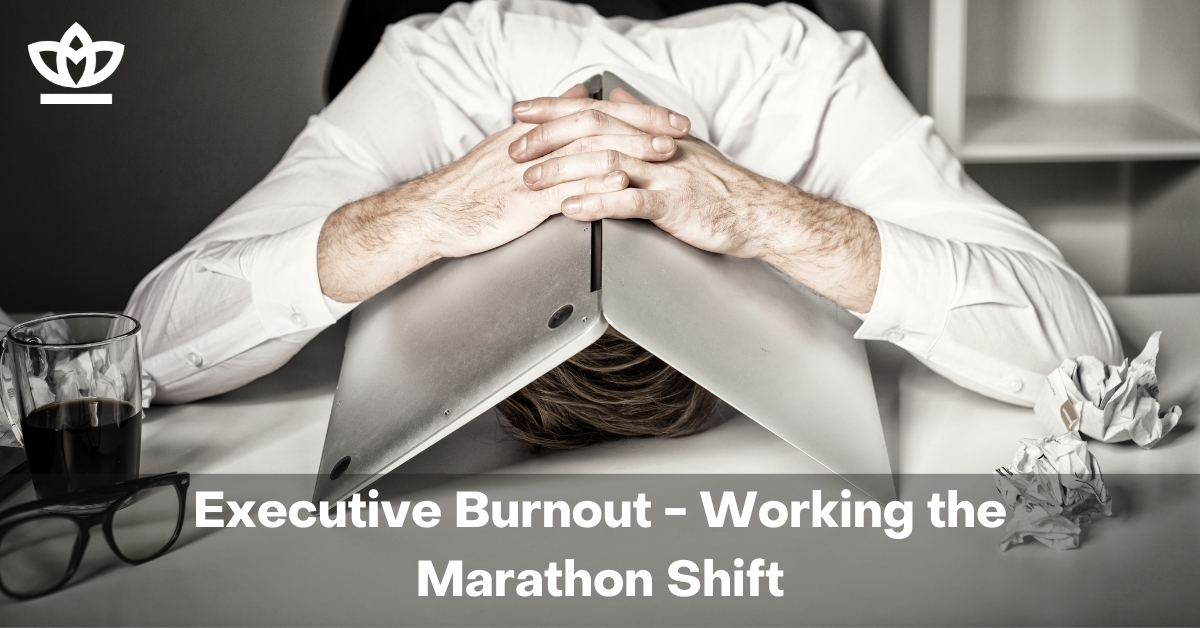Executive Burnout – Working the Marathon Shift

Anyone who has run a marathon can echo these words, “long-distance running is no cakewalk.” In fact, running those 42 kilometers places your body under such pressure and fatigue that an individual often needs up to two to three months to recover fully.
This may seem like a long time, it did to me at first. But that three month time span is actually only enough for bodily recovery. According to Dr. Timothy Noakes, an exercise physiologist at the University of Cape Town in South Africa, it “probably takes at least six months for the mind to recover fully.”
India’s three time winner of the Indira Marathon, Ram Singh Yadav, says, “I have been running since long and can tell you that the body needs rest after strenuous sessions as part of preparations for the actual event.”
Professional athletes know better than anyone else the importance of recovery. They have to. If they don’t, they’ll get hurt.
Just like an athlete, executives, and people with high stress or high pressure jobs, need to take time to “recover” from long days in the office.
Burning Out, One Executive at a Time…
Maybe the big pay cheque keeps them going. Perhaps they feel trapped because they know if they take a day off the company might have a crash landing. Or maybe they feel like work is all they have. Whatever brings top executives to work and keeps them there late into the night, is also burning them out.
In a recent study completed by the Department of Organisational Behaviour and Human Resource Development, Management Development Institute (MDI), in Gurgaon, more burnouts are hurting the top Indian corporate sector than ever before.
In fact, the study found that, “Many of the most unhappy, unproductive and potentially-destructive employees can be found in the executive suite.” The study was conducted among executives in the manufacturing and service sectors and mental health professionals from government and private hospitals in 20 states.
According to mental health professionals across India, burnout accounts for nearly 30% of all cases they receive each month.
Professor Radha R Sharma, the leader of the study, says that, “Privatisation, mergers, acquisition, downsizing and outsourcing are the prominent reasons, creating insecurity, anxiety and depression, making executives vulnerable [to burnout].”
“Insecurity, anxiety, and depression…”– sounds like a recipe for disaster if you ask me.
The Effects of Burnout

When hard working people come to a point of mental and physical exhaustion (burnout), they have a choice to make: Will I take a break or will I keep working?
If they decide to keep going, something will have to keep them going. At first they might simply use coffee, or chocolate to deal with a long day. But after a while that’s not enough.
Self medication, using drugs and alcohol to enhance your performance at the workplace, can give that extra boost. And often, this is what people eventually turn to as a solution.
Paul Kirsten works as a therapist at Castle Craig Hospital in Scotland. Years ago, Paul became a victim of “burnout.”
As the owner of three restaurants, he found himself in high stress situations daily. Paul chose to self-medicate, using drugs like cocaine and alcohol, to help.
“I used them to cope with my working environment,” he said. “I didn’t have the skills to deal with the pressures of work, and I would use drugs to cope with the pressures and deal with the stress.” Paul’s choice to self medicate lead to a serious cocaine addiction that almost took his life.
Many people with high pressure jobs find themselves in similar situations, and choose to self medicate. This not only endangers you, but the rest of the company as well.
Peter McCann, the Chairman of Castle Craig Hospital says that, “Many cocaine users are ‘functioning addicts’ for 10 years or more. But excessive use of cocaine can lead to dysfunctional judgment, risky decision-making and reckless gambling with company assets.”
Functioning as an addict in the workplace not only places you at risk, but the rest of your company as well. Having the physical ability to work doesn’t necessarily mean you’re doing a good job. For example, in Australia, executive burnout contributes to a $20 billion “stress bill” that businesses have to deal with every year.
Symptoms of Executive Burnout
Experts say that typical symptoms of executive burnout include:
[ref]http://articles.timesofindia.indiatimes.com/2005-07-03/india/27847800_1_top-executives-burnout-hospitals[/ref]
- Depression or anxiety
- Overall lack of energy
- Aggressive behaviour
- Irritability
- Reliance on Alcohol or drugs to get through the day
- Feeling emotionally exhausted
These symptoms are the feelings that high stress or high pressure situations can produce.
Get help today
If the symptoms listed above are close to home for you, don’t hesitate to seek help today. Companies are becoming more and more understanding and open to allowing their executives to seek help, and centres from around the world are providing the help that executives need.

In particular, Castle Craig Hospital in Scotland has set itself apart as a leader in executive rehab. They understand the unique issues executives face and will work with you every step of the way. Although there are many benefits to going out of the country for this type of treatment, there are also some capable centres in India that understand the needs of executives. Please contact us if you need any further help.
You might be surprised when you discover the number of people struggling with a similar condition as you. You are not alone.













